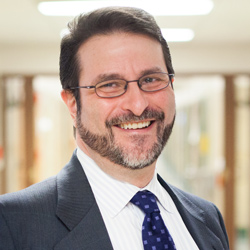Symposium Looks to Israel as a Role Model for Water Sustainability
“Water in Israel and the Middle East” took place May 18
As droughts become more frequent and industry and agriculture continue to pollute potable water sources, the world may be in store for a full-fledged water crisis. In order to prevent this potential catastrophe, Northwestern experts say we should look to Israel.

This week, international experts met at Northwestern for a half-day symposium to explore how the control of and access to water play into transboundary politics and whether recent advances in water technologies in Israel may provide a model for sustainable water development in other water-poor regions around the world.
Hosted by the Northwestern Center for Water Research and the Crown Family Center for Jewish and Israel Studies, “Water in Israel and the Middle East: Geopolitical Conflicts, Technological Challenges, and Sustainable Solutions” took place Wednesday, May 18.
“Water is a resource that we need to safe guard,” said Julio M. Ottino, dean of Northwestern Engineering. “We need to develop best practices for conservation, and many of those best practices are already in use in Israel.”
The symposium comprised two sessions moderated by Packman and Elie Rekhess, the Crown Visiting Professor in Israel Studies at Northwestern. “Water Management and Reuse in Israel” featured Sara Elhanany, director of the water quality division at the Israel Water Authority, and Noam Weisbrod, director of the Zuckerberg Institute for Water Research at Ben-Gurion University. “Transboundary Water Issues in the Middle East” featured Stuart Schoenfeld, associate professor at Glendon College and at the Institute for Research and Innovation in Sustainability at York University, and Jeffrey Sosland, assistant professor at American University.
Elhanany kicked off the symposium by discussing how Israel has addressed its pressing water challenges. The country has worked to reduce water consumption, reuse wastewater, desalinate seawater, and improve water quality in wells and contaminated aquifers. It is now the leading country in wastewater reclamation and inexpensive desalination.
Weisbrod reinforced Elhanany’s points by adding that 82 percent of Israel’s wastewater is recycled and reused in some fashion. He also described a proposal to build a desalination plant to share water with Jordan.
Schoenfeld discussed how water scarcity has been a motivator to make peace among historically contentious regions. He said that sharing water means that countries must lose sovereignty, but that comes with the benefit of higher quality water.
Sosland wrapped up the symposium by talking about how water can be a basis for peace. He discussed the history of water negotiations between Israel and Jordan, which have encouraged the sometimes-warring neighbors to move toward peace.
